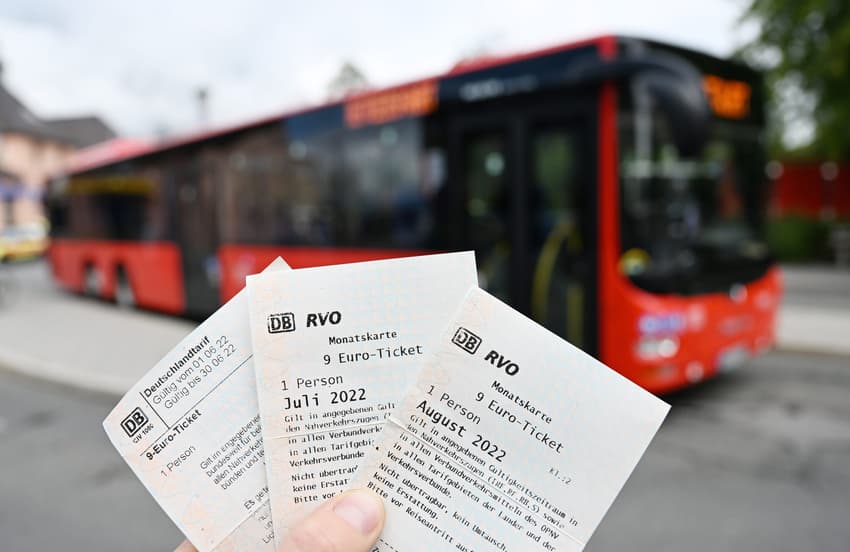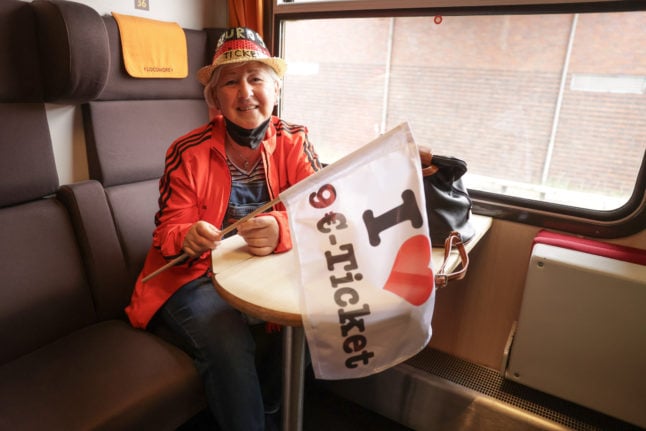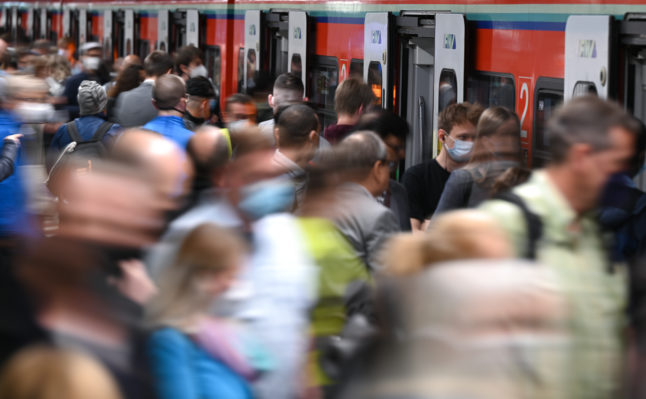EXPLAINED: The German states pushing for €9 ticket follow-ups

Germany's nationwide €9 ticket has come to an end but some states are proposing new reduced-price travel offers. Here's a look at the plans and suggestions.
It's been the headline news of the summer - people across Germany have jumped at the chance to use public transport, including regional trains, for just €9 per month in June, July and August.
But the offer, which was brought into help people cope with rising energy prices as well as lure drivers away from their cars, has come to an end. The last day of the cut-price ticket was August 31st.
The German government is not extending the offer or introducing a follow-up ticket from September, although the Transport Minister has said authorities will look into reduced price transport offers in the coming months.
Despite this, some states are unveiling plans - or talking about proposals - for a new transport ticket to follow on from the €9 ticket.
READ ALSO: 'Complete success': Germany sees 52 million €9 tickets sold
Although nothing is set in stone yet, here's the outlook.
Berlin plans new three-month offer
The government in Berlin is pushing for a successor offer for the €9 ticket to bridge the gap with a possible new nationwide ticket. Following a meeting in the coalition, which is led by the Social Democrats, politicians decided that a new offer should be introduced from October 1st.
"We have agreed on a Berlin relief package including a supplementary budget," said Green Party politician Bettina Jarasch, adding that central to the agreement is a new public transport ticket offer.
However, the new ticket plan is only a "temporary connecting ticket for Berlin in 2022," said the governing mayor Franziska Giffey after a coalition meeting last Friday.

A campaigner for the €9 ticket attends a demonstration in Berlin on August 29th. Photo: picture alliance/dpa | Jörg Carstensen
She said it was planned for the months of October, November and December. The price of the follow-on €9 ticket, as well as the area it will be valid in, still needs to be clarified, Giffey said.
Although Berlin authorities say they plan to pursue the ticket, many details are still up in the air so we'll keep you posted.
READ ALSO: Berlin considers extending €9 ticket
North Rhine-Westphalia (NRW) proposes two follow-up tickets
NRW transport minister Oliver Krischer (Greens) has backed the two-tier successor model proposed by his own party.
"A ticket for €29 a month for regions such as NRW, and a €49 ticket valid nationwide," Krischer told WAZ on Friday.
During a talk with German automobile club ADAC and other politicians, Krischer said there should be a follow-up solution to the ticket "before Christmas".
However, Krischer hasn't promised anything - and referred to tough negotiations taking place in the government over public transport.
"When it comes to financing, the responsibility lies with the federal government," he said, adding, "If the federal government doesn't agree, we'll have to look to the state level to see what works."
He said the question would then be whether the state budget could handle it.
READ ALSO: 5 things to know about public transport in Germany after the €9 ticket
Lower Saxony wants to team up with northern states
Lower Saxony, home to Hanover, has also expressed plans for a possible follow-up model to the €9 ticket. The state's transport minister Bernd Althusmann can imagine an "affordable, statewide annual ticket" for the north, he recently told DPA.
For this, he said, the federal government would have to increase regionalisation funding, and the state and local authorities would have to participate.
Together with Bremen and Hamburg, "a statewide €49 ticket would then be possible in my opinion," Althusmann said.
What about Saxony and Thuringia?
The German states of Saxony and Thuringia are advocating for the Green Party's successor model: a regional €29 ticket and a nationwide €49 ticket. "The €9 ticket needs a follow-up offer," said Saxony's state leader Marie Müser on Friday.
The transport minister of Thuringia, Susanna Karawanskij (of the Left party) also proposed a 'Klimaticket' (climate ticket) in the form of a €365 annual offer.
Hesse wants to help most vulnerable
The central state of Hesse, where Frankfurt is located, is looking towards a two-tier model that would take earnings into focus.
"A €31 ticket for those in need and a €69 ticket for others," suggested Hesse's Minister of Economics Tarek Al-Wazir (Greens) in an interview with Hessenschau.
However, the funds for this would have to come from the federal government, Al-Wazir said. "But, as long as (Finance Minister) Christian Lindner says he won't give a euro either for the expansion of the offer or for a follow-up offer of the ticket, there can be no solution."
Lindner has consistently spoken out against a successor to the €9 ticket.

People at Frankfurt's main station on June 1st, the start of Germany's €9 monthly travel ticket offer.
Photo: picture alliance/dpa | Arne Dedert
Bavaria: states have 'other priorities'
Some states are not in favour of bringing in their own €9 solutions for now.
"We have other priorities in all 16 federal states," said Bavaria's transport minister Christian Bernreiter in an interview with Merkur, adding: "A broad range of public transport services is more important to me than a cheap fare."
The remaining federal states are also not planning a successor or an extension of the €9 ticket for now.
"For us, it is important that the federal government submits a viable and sustainable proposal in a timely manner and commits to its full financing," Mecklenburg-Western Pomerania's economy and transport minister Reinhard Meyer said.
There have been similar reactions from Hamburg, Schleswig-Holstein, Saxony-Anhalt, Rhineland-Palatinate, Saarland, Baden-Württemberg and Brandenburg.
Comments
See Also
It's been the headline news of the summer - people across Germany have jumped at the chance to use public transport, including regional trains, for just €9 per month in June, July and August.
But the offer, which was brought into help people cope with rising energy prices as well as lure drivers away from their cars, has come to an end. The last day of the cut-price ticket was August 31st.
The German government is not extending the offer or introducing a follow-up ticket from September, although the Transport Minister has said authorities will look into reduced price transport offers in the coming months.
Despite this, some states are unveiling plans - or talking about proposals - for a new transport ticket to follow on from the €9 ticket.
READ ALSO: 'Complete success': Germany sees 52 million €9 tickets sold
Although nothing is set in stone yet, here's the outlook.
Berlin plans new three-month offer
The government in Berlin is pushing for a successor offer for the €9 ticket to bridge the gap with a possible new nationwide ticket. Following a meeting in the coalition, which is led by the Social Democrats, politicians decided that a new offer should be introduced from October 1st.
"We have agreed on a Berlin relief package including a supplementary budget," said Green Party politician Bettina Jarasch, adding that central to the agreement is a new public transport ticket offer.
However, the new ticket plan is only a "temporary connecting ticket for Berlin in 2022," said the governing mayor Franziska Giffey after a coalition meeting last Friday.

She said it was planned for the months of October, November and December. The price of the follow-on €9 ticket, as well as the area it will be valid in, still needs to be clarified, Giffey said.
Although Berlin authorities say they plan to pursue the ticket, many details are still up in the air so we'll keep you posted.
READ ALSO: Berlin considers extending €9 ticket
North Rhine-Westphalia (NRW) proposes two follow-up tickets
NRW transport minister Oliver Krischer (Greens) has backed the two-tier successor model proposed by his own party.
"A ticket for €29 a month for regions such as NRW, and a €49 ticket valid nationwide," Krischer told WAZ on Friday.
During a talk with German automobile club ADAC and other politicians, Krischer said there should be a follow-up solution to the ticket "before Christmas".
However, Krischer hasn't promised anything - and referred to tough negotiations taking place in the government over public transport.
"When it comes to financing, the responsibility lies with the federal government," he said, adding, "If the federal government doesn't agree, we'll have to look to the state level to see what works."
He said the question would then be whether the state budget could handle it.
READ ALSO: 5 things to know about public transport in Germany after the €9 ticket
Lower Saxony wants to team up with northern states
Lower Saxony, home to Hanover, has also expressed plans for a possible follow-up model to the €9 ticket. The state's transport minister Bernd Althusmann can imagine an "affordable, statewide annual ticket" for the north, he recently told DPA.
For this, he said, the federal government would have to increase regionalisation funding, and the state and local authorities would have to participate.
Together with Bremen and Hamburg, "a statewide €49 ticket would then be possible in my opinion," Althusmann said.
What about Saxony and Thuringia?
The German states of Saxony and Thuringia are advocating for the Green Party's successor model: a regional €29 ticket and a nationwide €49 ticket. "The €9 ticket needs a follow-up offer," said Saxony's state leader Marie Müser on Friday.
The transport minister of Thuringia, Susanna Karawanskij (of the Left party) also proposed a 'Klimaticket' (climate ticket) in the form of a €365 annual offer.
Hesse wants to help most vulnerable
The central state of Hesse, where Frankfurt is located, is looking towards a two-tier model that would take earnings into focus.
"A €31 ticket for those in need and a €69 ticket for others," suggested Hesse's Minister of Economics Tarek Al-Wazir (Greens) in an interview with Hessenschau.
However, the funds for this would have to come from the federal government, Al-Wazir said. "But, as long as (Finance Minister) Christian Lindner says he won't give a euro either for the expansion of the offer or for a follow-up offer of the ticket, there can be no solution."
Lindner has consistently spoken out against a successor to the €9 ticket.

Bavaria: states have 'other priorities'
Some states are not in favour of bringing in their own €9 solutions for now.
"We have other priorities in all 16 federal states," said Bavaria's transport minister Christian Bernreiter in an interview with Merkur, adding: "A broad range of public transport services is more important to me than a cheap fare."
The remaining federal states are also not planning a successor or an extension of the €9 ticket for now.
"For us, it is important that the federal government submits a viable and sustainable proposal in a timely manner and commits to its full financing," Mecklenburg-Western Pomerania's economy and transport minister Reinhard Meyer said.
There have been similar reactions from Hamburg, Schleswig-Holstein, Saxony-Anhalt, Rhineland-Palatinate, Saarland, Baden-Württemberg and Brandenburg.
Join the conversation in our comments section below. Share your own views and experience and if you have a question or suggestion for our journalists then email us at [email protected].
Please keep comments civil, constructive and on topic – and make sure to read our terms of use before getting involved.
Please log in here to leave a comment.